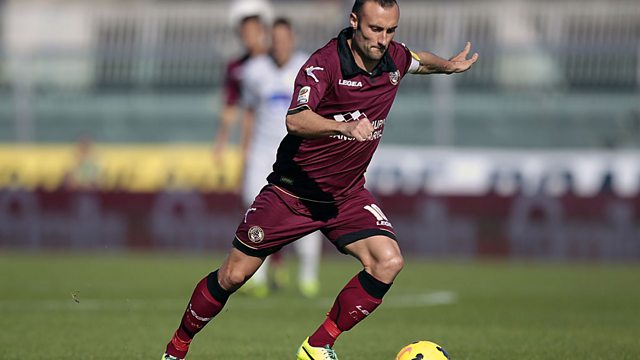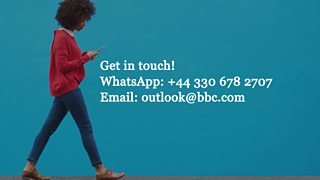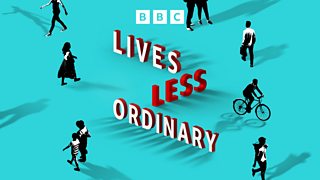Footballer Fighting to Save his Son
Livorno captain Andrea Luci wants his footballing fame to help research into a cure for his son's rare condition - Fibrodysplasia Ossificans Progressiva.
Livorno captain Andrea Luci tells us his footballing fame will help research into a cure for his son's rare condition - Fibrodysplasia Ossificans Progressiva .
3D animation artist Braam Jordaan is one of the leading figures in South Africa's deaf community; he reflects on his childhood under Apartheid and the signing at Nelson Mandela's memorial service.
And from seedy London clubs to the roof of Buckingham Palace - the epic journey of Madness lead singer Suggs.
Photo image: Andrea Luci playing football. By Gabriele Maltinti, Getty Images
Last on
More episodes
Transcript of Braam Jordaan Interview
[NB: VOICE OF SIGN LANGUAGE INTERPRETER FOR BRAAM]
INTERVIEWER:�� Could I start Braam by asking you how it is that I am able to speak to you down a line from South Africa even though you are profoundly deaf, how does that work?
��
BRAAM:�� Yah well we are working through a sign language interpreter.
��
INTERVIEWER:�� And what language is the sign language interpreter speaking?
��
BRAAM:�� She's using South African sign language, which is a language in its own right, has its own facial expressions, movements and hand shapes, and same structure as any other language. So it's just the same as any other official language in South Africa and all other different countries' sign languages. And South African sign language is my mother, mother tongue.
��
INTERVIEWER:�� And do you have a sign language interpreter with you at all times?
��
BRAAM:�� Well no I don't. It's only for special occasions like radio interviews or award ceremonies or when I studied at university. So I don't always have someone. South Africa only has one interpreter for every ten thousand deaf people in South Africa. So it's very rare.
INTERVIEWER:�� So do you speak with your own voice at any time, or do you always use sign language?
BRAAM:�� I always use sign language. No I don't really use my voice.
��
INTERVIEWER:�� And is that because it's impossible for you to articulate clearly because of your deafness?
��
BRAAM:�� I was born from a deaf family, I've got deaf parents, and my first language is sign language, and we didn't use voice, and we signed. So when I went to school they forced us to get speech therapy with a balloon, and we had to learn to speak the alphabet. I can speak Afrikaans but it's not my language. I can't express myself that well, I can only do that in sign language.
INTERVIEWER:�� So tell me a little bit about your family background and your childhood?
��
BRAAM:�� I was born in the apartheid era, and during that time education wasn't at a very high standard. My parents, they got divorced when I was young. I lived with my mum in a room that's as small as this studio - six by six metres. And we had a bed, my mum's bed, my bed, a TV, a microwave, and a table - that's it. And I think that was for eight years that I lived like that. But I escaped from reality through art.
INTERVIEWER:�� And both your parents were profoundly deaf?
��
BRAAM:�� Yes, they are profoundly deaf, and they were both born deaf, as I was.
INTERVIEWER:�� And did you have other deaf relations?
��
BRAAM:�� Yeah, yes, I have different family members that are deaf, there's about forty deaf people within my far family so through cousins and, and all of that and through marriage, yeah.
INTERVIEWER:�� And why is that? Is there a particular illness that your family has that causes deafness?
��
BRAAM:�� Yeah it's a genetic deafness. I've been deaf since I was a worm, so… (LAUGHS)
INTERVIEWER: (LAUGHS)
So tell me about your schooling, because you've said that this was during the apartheid era. Were there different schools for white deaf people and black deaf people?
��
BRAAM:�� Yes, yes there was. During the apartheid time there were schools for, for black children and white children, and I was born in Johannesburg and I moved to the south of Cape Town when I was two. And I went to a big school, which was kind of like an institute, it was Worcester, in the area of Worcester. They had two schools there. But my school, it was about eight football fields big, and there were two hundred and fifty children in the school. And a few kilometres from that school they had another school, not a very big school, but they had eight hundred different coloured or, well it was a black school for, for black deaf children.
INTERVIEWER:�� What did you think about the fact that there were, were different schools for white and black deaf children?
��
BRAAM:�� Our family didn't agree with what happened during the apartheid time.
��
INTERVIEWER:�� And as a young boy were you angry about it?
��
BRAAM:�� It's something that we got used to. It's sort of like being brainwashed by the system during that time. You know after apartheid I went in 1997, I went to a national youth leadership camp, and that was exactly the time that I found out that, wow, diversity is beautiful. We have different cultures, we have different languages, and it was the right thing to do.
INTERVIEWER:�� So tell me about the day when you found out that the two schools were planning to get together. How did that happen? How did the news come to you?
��
BRAAM:�� I was about thirteen years old. I was staying in boarding school and then once a month I would also see my family in Cape Town. And they never came during the week, on a school day, and they came during that week, and they said that they needed to vote for the deaf black and white children to be a mixed race school. And that was during the time that Madiba was freed from prison, and I think there was, the majority vote said yes we needed to ... it. And the next year I think there was about four or, or first three deaf black people that came to the school, and they were more into soccer and I was more into rugby and cricket and you know we started sharing it. And it was so interesting to share that, and, and I played games with them, they played games with me, and, and it was beautiful.
��
INTERVIEWER:�� You said to me earlier that you escaped into art. Can you tell me a little bit more about what art meant to you?
��
BRAAM:�� Well, art, you know the colour is like my kind of music, the creativity is like my music. So for example you know when I went through a hard time of communication in apartheid and, and I needed to express myself, I did it through art. I started making short films and animation on paper. That's how I escaped from reality yeah.
INTERVIEWER:�� What was it about animation in particular that captivated your interest?
��
BRAAM:�� People have five senses, I've got one missing, so the rest was more stronger. So visually it's strongly affiliated with my eyes, and I like movement as well. I travel throughout the world and I like to sit and just watch how people behave when they walk, when they move around, how the world revolves around me. So that's why I started getting involved in animation.
INTERVIEWER:�� What is the piece of work you're most proud of having done?
��
BRAAM:�� I recently started working within the deaf community and you know trying to express sign language very strongly. I've got deaf people that also work with me, we have a sign language dictionary that we developed. I've been to Japan, I've taught people how to use sign language in animation. I think that's the most proudest thing, because it relates to my language, my culture, and I can give back from where I came from. So that, that's made me proud yeah.
��
INTERVIEWER:�� Can you tell me about a particular piece of work you've made which uses sign language in animation, just to give us an example?
��
BRAAM:�� We have a sign language dictionary. When children are born, they'd be with their parents, both the parents don't know sign language, so both of them learn at the same time, the child and the parents. So the child can click on the hand shape, like A, B or C, and then there's a list of different words that comes up that they can choose, and then it gives the explanation. And there's a rabbit that signs how you would sign that word.
INTERVIEWER:�� You've mentioned that you do a lot of international travel. Are there difficulties that are presented by being a deaf person travelling internationally?
��
BRAAM:�� Oh yes and no. I've been to forty different countries. I, I love travelling. I have some funny experiences, I flew from Johannesburg to Frankfurt, in Germany, and one of the air hostesses came to me and she said, 'When the people are leaving you need to stay.' So I waited and I feel, it felt very strange, it was, there was an old lady there with children. I've been travelling a lot so I got out and then again they said, 'No no no, you need to sit down.' So I said, 'Okay well, I don't want to make a scene.' And they said, 'Okay we're ready, you can come.' So I walked and there was a bridge that I had to walk over and there was a wheelchair waiting for me with my name, very big - Braam Jordaan, spelt - and there was a person in yellow waiting for me and I was so shocked because I said you know, 'Can you guys see that I'm walking? I refuse to sit on this wheelchair, I can walk. I have legs.' So I left. They were still following me, and I had to catch a connecting flight. So then on their system disabled passengers they don't say deaf, blind, or wheelchair or anything, and you know I said, 'You should have provided an interpreter.' So, you know at the same time I educated them how to deal with it, but it, that was quite a funny experience for me.
��
INTERVIEWER:�� How would you say conditions are for deaf people in South Africa today?�� Have they changed a lot since you were growing up?
��
BRAAM:�� I think it's improved a lot, yes. We have the movement, we call it Deaf Rights Movement South Africa, which is starting to grow very strong. And the Deaf Federation of South Africa is doing a wonderful job. We have a deaf MP in Parliament, Doctor Wilma Newhoudt-Druchen who is a Member of Parliament, who is also fighting for deaf people's rights, but there's still more that needs to be done.
INTERVIEWER:�� I believe you were personally inspired by that deaf MP.
��
BRAAM:�� Yes, yes. She was the first deaf woman in Parliament. We had, there's another man in Canada but she was the first deaf woman. It was during, you know just after apartheid and all of that, she's just, wow.
��
INTERVIEWER:�� So when you saw the sign language interpreter at Nelson Mandela's memorial service, presumably on TV, what was your reaction?
��
BRAAM:�� You know, Madiba was a great anti-apartheid icon. He did a lot for the deaf community. And we wanted to pay our tributes and respect to him because it's his memorial service, and it felt like it was a linguistic apartheid that, that we experienced. And I felt insulted because how can we honour him if our voice is not heard, and if we can't access it?
INTERVIEWER:�� So can you just describe what this interpreter was doing when you saw him?
��
BRAAM:�� Well, (LAUGHS) he was creating his own signs. It's like he was in his own little world.
INTERVIEWER:�� And you must have been very upset.
��
BRAAM:�� Yes, I was very upset. I forgave him. I've forgiven him, I don't want to focus on the individual, I think, and we need to focus our, our focus now on the Government, who hired him in the first place.
INTERVIEWER:�� Did you ring up and complain?
��
BRAAM:�� I've emailed the South African Human Rights Commission, I encouraged the deaf community to respond, I've had interviews with ���˿���, and Australian newspapers, New Zealand newspapers. I think about eight thousand articles worldwide that was spread. I think it's a perfect opportunity to create awareness about our human rights. And it's time to end communication and linguistic apartheid.
��
(END OF INTERVIEW)
Broadcasts
- Thu 19 Dec 2013 12:06GMT���˿��� World Service Online
- Thu 19 Dec 2013 23:06GMT���˿��� World Service Online
- Fri 20 Dec 2013 03:06GMT���˿��� World Service Online



